- Home
- John Harris
Take or Destroy!
Take or Destroy! Read online
TAKE OR DESTROY!
A novel of Alamein
John Harris
First published 1976 © John Harris 1976
ISBN 0 09 126280 1
The qualities of a successful poacher, cat burglar and gunman would content me.
Field Marshal Lord Wavell, describing his idea of a good infantryman, in a lecture to the Royal United Service Institution, 15 February 1933
You will usually find that the enemy has three courses open to him, and of these he will usually adopt the fourth.
Helmuth von Moltke
Your prime and main duty will be to take or destroy at the earliest opportunity the German--Italian Army commanded by Field Marshal Rommel together with all its supplies and establishments in Egypt and Libya.
Winston Churchill, in his directive to General Alexander, Commander in Chief in the Middle East, 10 August, 1942
Map
The quotations at the head of each chapter are taken from the official report on Operation Cut-Price, 29 October to 1 November, 1942
Part 1 – The Plan
Information reaching Eighth Army Intelligence indicated that unexpected quantities of petrol and ammunition for Field Marshal Rommel had arrived at the port of Qaba.
The white Egyptian town, hanging between the blazing sky and its reflection in the mirage which swept and rolled over the harbour, began to take on tinges of bronze and salmon pink as the blazing orb of the North African sun sank. The throat-parching heat, dusty from the desert and dry enough to strike everyone speechless by day, lifted as the earth cooled. The torment of the flies ceased and the figures moving sluggishly between the houses began to raise their heads and walk with a new energy, as though a weight had been lifted from their shoulders.
The signs on the walls, orange in the gaudy rays of fading light, were German over the old British and Arabic. They were peremptory, efficient and showed firmly who was in control. Young men, blond but burned black by the sun and wearing the stiff-peaked caps of the Deutsche Afrika Korps, moved about in the quickening twilight. Their uniforms were faded and sometimes consisted only of the briefest of shorts that left their brown legs bare to the groin. Among them were a few Italians, shabby in ill-fitting coats and baggy trousers like unbuckled plus fours.
Few of the houses in the narrow streets had escaped the scars of war. The struggle in North Africa had been going on for three years now and during the British occupation Mussolini’s Regia Aeronautica and later the German Luftwaffe had taken their toll. Since the Germans had arrived after the battle of Gazala and the retreat to El Alamein earlier in the year, it had been the RAF which had added to the destruction. Everything was pocked by bomb splinters, and on the whitewashed wall of one mauled wreck there was still the hand-written boast, ‘Score - 50 - not out.’ Over it the word, ‘Vinceremo’, had been daubed by some optimistic Italian.
Qaba had once been a pleasant watering place for wealthy Egyptians from Cairo, two hundred miles away. The Shariah Jedid, its steep central street, with its open-fronted garage-like shops, cut it in half like a sword stroke as it dropped down from the desert to the sea. To the west, dominated by the Ibn al As Mosque, lay the old Arab quarter below the rising ground known as Mas el Bub. It was a sprawling area of narrow alleys, called Wogtown by the departed British and the Borgo Nero by the newly arrived Italians. To the east, in the direction of the airfield and Ibrahimiya, a scruffy Arab village in a dip in the cliffs, lay the more modern residential area, with white bungalows stretching away along the edge of the sea. Most of these were occupied now by the garrison, the staff of the prisoner of war compound, and a few other fortunate Italians.
The old and the new came together on the waterfront at the Bab al Gawla, at the bottom of the Shariah Jedid, held apart, it seemed, by the remains of a Roman arch built by the Emperor Hadrian in the year A.D. 130. On the eastern side of the arch were a few larger buildings such as the Boujaffar Hotel, which had been taken over by the German town major for his headquarters, while on a small headland alongside the harbour stood the Mantazeh Palace, once the residence of a wealthy pasha, but now partly ruined, its mosaic floors smashed, its filigree work splintered and dusty.
Behind the town, at the top of the hill where the Shariah Jedid became the road to the desert, there was a stretch of orchard and vineyard which in turn gave way to patchy grass and saltbush. In front, where scrubby date palms shaded the water’s edge near the Ibn al As Mosque, there were two brilliantly white beaches, now occupied by the hulks of three bombed ships. Between these beaches lay a rocky promontory on which had been built the mole that circled the harbour.
The mole was a long one and ran in a rough arc over a base of concrete blocks lowered into position by the Egyptians in the Thirties and improved on by the British in 1940. It was high enough to keep away the wind, but it was uneven and broken here and there where it had been hit by British, Italian or German bombs. Inside, the rusting masts, funnels and wheelhouses of dead freighters protruded from the water, every one of them pitted and twisted by high explosive until they were almost unrecognizable as vessels.
What living shipping there was in the harbour was all concentrated towards a stone warehouse at the end of the mole -- three large coastal vessels lying on a trot one outside the other, with a fourth on its own nearer the entrance. It was an awkward arrangement but it had been forced on the harbour authorities by the absence of a tug and the demolitions the British had set in motion on their June retreat from Cyrenaica which had scuttled ships, desolated scrawny streets with holes, and brought down roofs and splintered trees.
The four coasters had arrived in the early hours of that morning. They had not been unexpected because signals had preceded them from Taranto, Corfu, Crete and finally Tobruk and Bardia, as they had made their hazardous voyage across the Mediterranean and along the North African Coast. Originally, there had been seven of them but one had been sunk by the watchful RAF off Corfu; a second had had to turn back to Tobruk with boiler trouble; a third, Umberto Uno, had had problems with her rudder and, three hours behind the others during the night crossing from Crete, had been picked up at dawn by a British destroyer.
Since there had been nothing much happening in Qaba for a fortnight, the whole of the town major’s staff had turned out to see the ships arrive - Colonel Hochstatter, the town major himself; Major Nietzsche, the military commander; Captain Wutka, the engineer; Fregattenkapitan von Steen, the harbourmaster; Captain Hrabak, the supply officer; even Captain Veledetti, the Italian in charge of the prisoner of war compound which had been set up near the harbour to keep the bombs away.
‘Petrol,’ Hochstatter said. ‘Petrol for the panzers!’
As the ships began with difficulty to edge alongside, they were eyed sullenly by Private Gaspare Bontempelli, of the 97th Mixed Engineer Company attached to the Pistoia Division of the Army Reserve. Plump and -- because he was always hungry -- known to his friends as Double Ration, Bontempelli, like so many Italians, couldn’t have cared less who won the war in North Africa, so long as he didn’t have to die in it. It wasn’t so much that he didn’t possess the dono di coraggio - the gift of courage -but that, as an extremely realistic young man, he preferred not to risk his neck in something for which he didn’t have much sympathy.
He regarded the desert with a loathing he found impossible to put into words, and for the life of him he couldn’t understand why three great nations should involve themselves in such a titanic struggle for its possession. Because he didn’t understand it, to Bontempelli the desert seemed bewitched. Like everyone else from the teeming cities of Italy, he hated the disembodied silences and the terrifying ghibli that clothed him in a cloud of fire, certain he’d be found days afterwards when it stopped blowing, with his own bullet in
his temple and his eyes and mouth full of sand.
Bontempelli lived by the black inert shape of a 47 mm. gun on the Mas el Bub side of the town, tormented by a desperate longing for Naples where his home was. In Taranto, where he’d last been stationed, there had at least been a young widow by the name of Maddalena Corri whose loneliness had made up for his homesickness. This place had nothing. Nothing. No beauty. No comfort. No music beyond the wailing half-notes of Arab wind instruments. Not even women. Apart, that was, he admitted, from Zulfica Ifzi, a plump seventeen-year-old Levantine he had discovered two months before in one of the two brothels the town sported, who had given up work to devote herself entirely to Bontempelli.
Not even Zulfica Ifzi’s attentions could make up for the discomforts of Qaba, however, and Bontempelli therefore detested his NCO, Sergente Barbella; his officer, Sottotenente Baldissera; the Prussian who ran the harbour gangs, Unteroffizier Upholz; and the German supply officer, Captain Hrabak - all of whom he considered pushed him around far too much. He also generously detested Marshal Ettore Bastico, his commander-in-chief; Field Marshal Erwin Rommel, the absent German commander; General Stumme, his very present deputy; Hitler; Mussolini; Churchill; Stalin; and everybody else he considered had contributed, however indirectly, to his presence in Qaba.
As a result, as the ships arrived -- when he’d half-hoped the campaign in North Africa would come to a stop through lack of supplies and they could all go home -- he raised a cynical cheer. To his surprise a man on his right echoed it and someone else took it up, until it swelled and spread, so that in no time at all every man of the 97th Mixed Engineer Company and Captain Hrabak’s few Germans was yelling hysterically, and the sullen look on Bontempelli’s dark handsome face changed to a smile of delight as he marvelled at the influence he could bring to bear when he felt like it.
Colonel Hochstatter didn’t share his happiness. ‘For God’s sake, Hrabak,’ he snapped. ‘Do you want the whole of North Africa to know these ships have arrived? Shut those men up!’
As the cheers died and the winches began to clatter, lorry-loads of camouflage netting began to roll towards the mole. Von Steen had spent three whole days scouring the back areas of the line for every scrap he could find, and as the ships’ engines stopped, his sailors began to swarm aboard and swing the nets into place so that the vessels began to merge in with the land. Smoke generators were also set up to create an artificial fog if necessary and Hochstatter watched with quiet pleasure.
‘A good job well done, Herr Hafenmeister,’ he said’.
Von Steen eyed him indifferently. Hochstatter had been a good officer once, but the effects of wounds had slowed down not only his movements but also his processes of thought; and his mind, as they all knew, was all too often occupied with worry for his wife and two daughters in Dusseldorf, because Dusseldorf was a regular target for the RAF and he hadn’t heard from them for months now. Hrabak was quite certain they were dead, and it was felt that Hrabak had good reason to know because his own wife and daughter had disappeared in one of the holocausts that had struck Essen.
Almost before their engines were shut down the ships’ captains were collected by car and taken to Hochstatter’s quarters in the Boujaffar Hotel.
‘Four ships out of seven,’ the elderly German commodore of the convoy observed bitterly as he accepted a drink. ‘It’s not many. Have you heard what happened to Umberto Uno?’
‘She’s in Alexandria harbour now,’ Captain Tarnow, the signals officer said. ‘Our agents report her anchored close inshore with British soldiers on board and a guard ship alongside.’
Hochstatter gestured. ‘We could have used the weapons she was carrying,’ he said. ‘But thank God we have -’ he glanced at the list von Steen had handed him ‘- Giuseppe Bianchi, Andolfo, Guglielmotti and Cassdndra.’
As the sun died, like a gigantic gun-flash in the western sky, the usual evening breeze started, stirring the palms and rolling little puffs of dust along the streets, and the Bedou traders who had spent the day huddled in their galabiyas in the shade of the trees near the mosque, their heads down, indifferent to the war that had spread along the whole north coast of Africa, began to rise. One after the other, gangling rope-haltered camels kneeling under the palms lurched to their feet and stood patiently, gurgling wetly as they disgorged. Then slowly they began to move off past the harbour.
Beyond the town, on the black ribbon of road that ran east and west along the coast, a group of bored Italians were cooking an evening meal of soup, pasta and beans among the broken walls. As the camels approached, one of them stood up stiffly, holding a rifle. The camels came to a shuffling halt, the dust they had stirred up drifting past the little encampment on the breeze. There was a brief exchange in a mixture of tongues, and then the Italian waved them on.
‘Aiee!’ The leading driver jabbed with a pointed stick at his animal’s testicles and the little caravan, stinking of uncured hides and dates, headed out of town towards Akka Dub, the next village along the coast in the direction of Fuka and the fig plantations of Daba. The Italians didn’t bother to look up. The evening movement of camels between Qaba and Akka Dub was normal enough. The Bedouin had been spectators of the North African struggle ever since the first forward pushes in 1940, looking on disinterestedly as fortunes swayed back and forth between El Agheila and El Alamein, even sharing the waterholes with lorry-borne young men of the long-range groups of both sides. Sometimes they lost a village hit by bombs or a camel killed by a mine. Sometimes they murdered a lost soldier or profited by a rifle stolen from a corpse, a can of petrol from a wrecked car, or a few tins of food from an abandoned lorry. But, profit or loss, it was always wise to be wary of the Messerschmitts and Hurricanes that prowled the sky during daylight hours, and they took care to remain within easy reach of shelter when the sun rose, and only move their caravans during the first hours after dusk. It had been going on so long now that neither side took much notice of them; the Italians, who had ages since grown sick of the war, least of all.
The caravan moved slowly eastwards, the camels like ungainly ships on a rough sea, their riders muffled to the eyes against the grit stirred up by the breeze. Occasionally a single rider turned north to where his family huddled with his few animals among the hills in a flat black tent smelling of sheep dung. Slowly the convoy became strung out, the leader a good half-mile from the last straggling beast, a dark brown animal with a hide covered with sores. Its rider crouched on its back, his head down, the grimiest of the whole string of grimy riders, the only portion of his face that could be seen the grey eyes glinting under his headdress and a large hooked nose poking through the wrapping of rags that surrounded his face.
Gradually the distance between the main group and the last rider increased until he had dropped far behind. Then, as night fell and the sky overhead became thronged with glowing stars, he sat up straighter on his limping animal and turned, not north but south, into the desert. Down there rolled the Great Sand Sea, known to the Arabs as ‘the Devil’s country’, almost impassable to anything but a camel, but interspersed with great areas of rocky outcrop, stony wastes and loose sand where vehicles could move.
After an hour’s riding, the camel halted and the rider stared about him. In front, the land rose a little, and on the horizon against the lighter hue of the night sky, he saw a square angular shape which didn’t fit into the landscape. The camel snorted and, as it moved forward again, a stone rattled under its great flat feet. From the direction of the square silhouette came the click of a rifle bolt being shoved home.
A light flashed briefly and figures appeared against the skyline. A few muffled words were exchanged and the rider of the camel slipped from the beast’s back. At the other side of the ridge, white blurs of faces turned, figures moved in the shadows and engines were started. The muffled shape in the grimy galabiya climbed into a lorry and someone offered him a cigarette. As he drew in a deep grateful puff and the smoke floated away on the night air, he gestured towards the eas
t.
‘Let’s go,’ he said. ‘And pile the coal on, please. I’ve got news that’ll make their hair stand on end at HQ.’
2
The decision was therefore made to mount a special operation to disrupt these important supplies, together with large amounts of spare parts for the Luftwaffe and the Afrika Korps panzer divisions which were also known to be in Qaba.
Brigadier Loftus, of Eighth Army Intelligence, was a big man with far too much flesh on his bones, and he was sweating profusely because his tent was stuffy in the morning sunshine. He was a dedicated man, and it never occurred to him to take an hour off for a breather, because he had already given his complete allegiance to the new commander of the Eighth Army and was prepared to work every hour that God sent to make him successful.
The new man hadn’t been long in North Africa -- barely long enough to get his knees brown, in fact -- and to the sunburnt desert veterans, he hadn’t any particularly remarkable physical attributes with his fair hair, sharp enquiring nose and pale blue eyes. Pale though they were, however, those piercing eyes seemed to Loftus to miss nothing and there was a steely quality behind them that indicated an unexpected depth of character. It was said the general was lacking in warmth, but he was incisive, firm of purpose and, as quite a number of indifferent officers had already found out, not over-willing to make allowances for the fallibility of others. He mightn’t look very much like the sort of man who would win the hearts of his soldiers, but he did seem to be the very man who might do something about the Afrika Korps and especially about Rommel.
Rommel had caught the imagination of every man in North Africa, and his soldiers -- Erwin’s Army, they were called -- with their palm tree insignia, sun-bleached hair and bright blue eyes, had built up a legend of invincibility that was hard to break down. Because their general was good and an honourable man, too, his Afrika Korps was good also and its soldiers were clean fighters. Well equipped with excellent weapons, they envied the British nothing except their cigarettes, and it was little wonder the Eighth Army admired them.

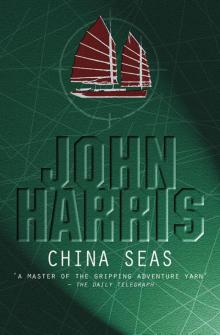 China Seas
China Seas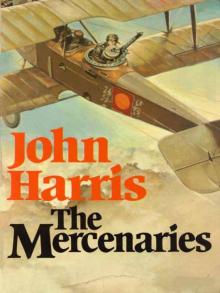 The Mercenaries
The Mercenaries Road To The Coast
Road To The Coast The Thirty Days War
The Thirty Days War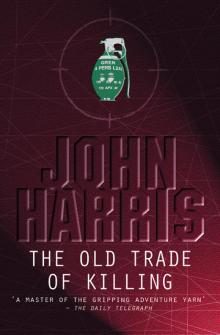 The Old Trade of Killing
The Old Trade of Killing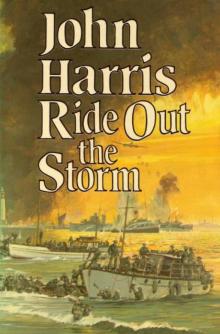 Ride Out The Storm
Ride Out The Storm Corporal Cotton's Little War
Corporal Cotton's Little War Fox from His Lair
Fox from His Lair Paint The Rainbow
Paint The Rainbow Flawed Banner
Flawed Banner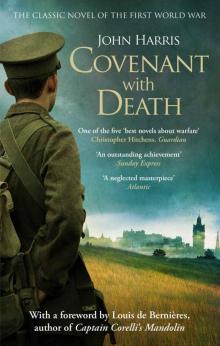 Covenant with Death
Covenant with Death So Far From God
So Far From God The Sea Shall Not Have Them
The Sea Shall Not Have Them The Cross of Lazzaro
The Cross of Lazzaro Smiling Willie and the Tiger
Smiling Willie and the Tiger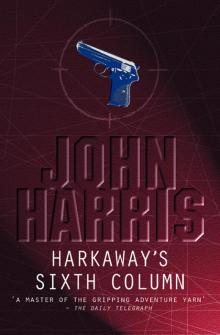 Harkaway's Sixth Column
Harkaway's Sixth Column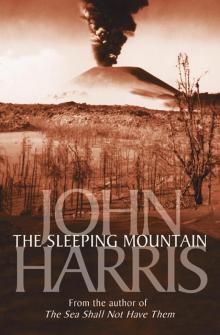 The Sleeping Mountain
The Sleeping Mountain The Claws of Mercy
The Claws of Mercy North Strike
North Strike Picture of Defeat
Picture of Defeat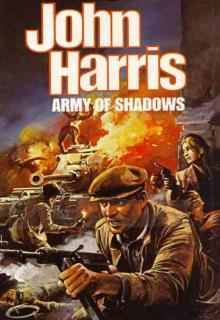 Army of Shadows
Army of Shadows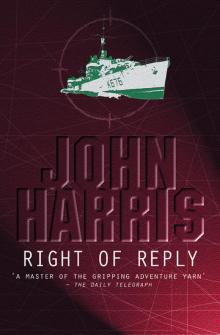 Right of Reply
Right of Reply Getaway
Getaway The Lonely Voyage
The Lonely Voyage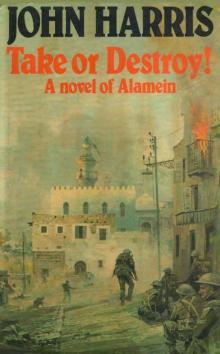 Take or Destroy!
Take or Destroy!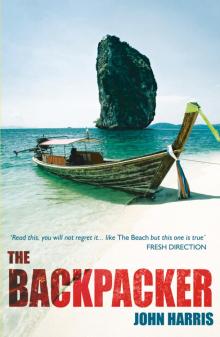 The Backpacker
The Backpacker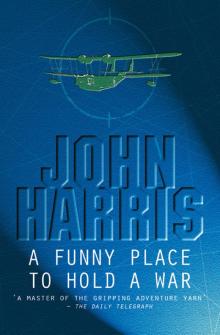 A Funny Place to Hold a War
A Funny Place to Hold a War Swordpoint (2011)
Swordpoint (2011) A Kind of Courage
A Kind of Courage